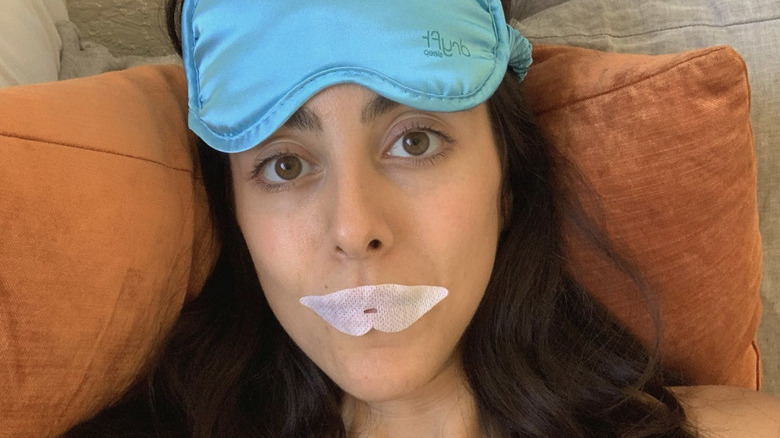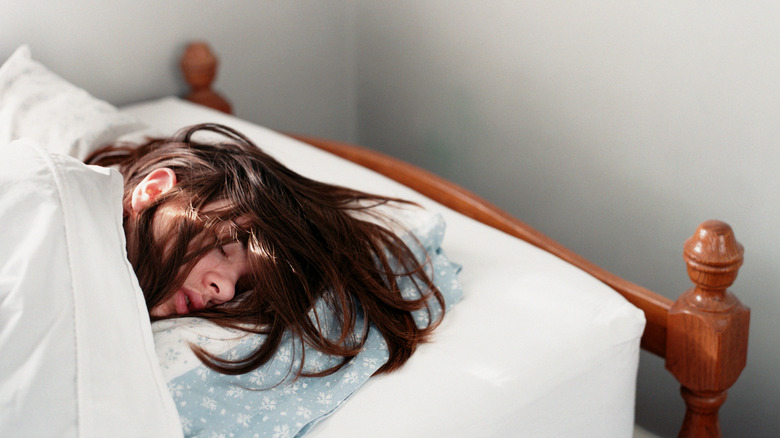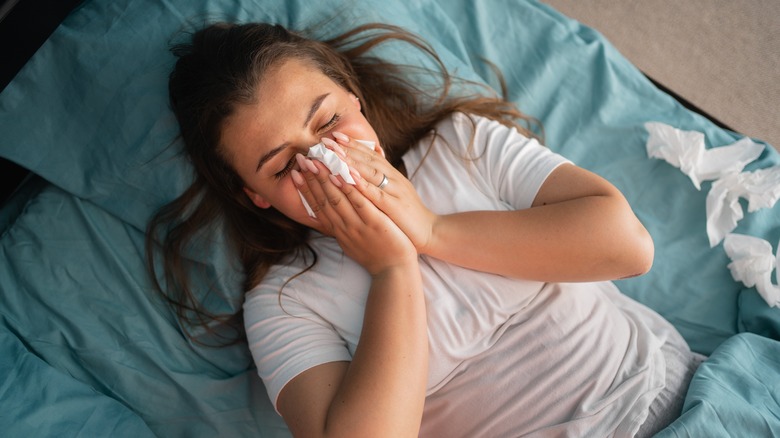Mouth Taping Is All The Rage But Comes With More Than A Few Risks
One of the latest wellness trends to make the rounds on TikTok is something called mouth taping. Various videos on the social media platform claim the practice can improve sleep quality, put an end to snoring, and even snatch your jawline if you do it regularly. But just like the TikTok morning shed trend which was, to no surprise, too good to be true, the results of mouth taping aren't exactly all that.
Taping your mouth shut while sleeping is nothing new. Conceived in the 1940s and 50s by Russian doctor Konstantin Pavlovich Buteyko to help people regulate their breathing when they were asleep, there are some benefits to the practice. The main one being that it nips mouth breathing in the bud. "Mouth breathing significantly impacts dental health with an increased risk of cavities, dry mouth and bad breath," Erin Fraundorf, DMD, MSD exclusively tells Women. "Mouth breathing during growth and development (ie: in children) can also can lead to a restricted upper jaw width and more vertical growth pattern of the lower jaw."
But because TikTokers are preaching other benefits of mouth taping, most notably a sculpted jaw and red-carpet-ready chin, we took it upon ourselves to get to the bottom of the claims. In addition to Dr. Fraundorf, Women exclusively spoke to board-certified physician and certified sleep specialist Dr. Angela Holliday-Bell to unpack this trend.
What mouth taping is supposed to do
The major benefit that supposedly comes with mouth taping is that it forces the person wearing the tape to breathe through their nose — which can be a better way to breathe. "Nasal breathing is a more efficient and effective way of breathing than mouth breathing as it humidifies and filters air by filtering out harmful allergens, pathogens and dust, defending our bodies against infection and allergies," says Dr. Fraundorf. When you breathe through your nose, you also take deeper breaths and get more oxygen, she added. Finally, "through nasal breathing, you produce a gas called nitric oxide which increases blood flow, lowers blood pressure and improves brain function," explains Dr. Fraundorf.
Some people also claim that breathing through your nose helps you get a good night's sleep, although evidence is anecdotal. "Inadequate sleep is associated with a wide range of health issues, including high blood pressure, cardiovascular disease, dementia, diabetes, weight gain, and mental health conditions like depression," says Dr. Fraundorf. "Therefore, improving your sleep should, in theory, help work against these conditions."
As Dr. Holliday-Bell points out, however, there's still not enough evidence to support the practice of mouth taping, and not a lot of research exploring the alleged health benefits. "There have been some limited studies that showed decreased snoring in individuals with mild sleep apnea who used mouth taping, but more research on its use is necessary," she says.
The risks of mouth taping
It's important to weigh the risks before attempting mouth taping. If you have a deviated septum, cold congestion, or another condition that makes it difficult to breathe through your nose, it's probably best not to try it. "If someone truly needs to breathe through their mouths while sleeping due to nasal obstruction or other reasons, mouth taping can lead to difficulty breathing at night," says Dr. Holiday-Bell. "It can also lead to aspiration (where contents of your stomach get into your lungs due to reflux or vomiting)." Not good.
"Some people may experience irritation from the tape being used as well," Dr. Holiday-Bell adds. If you have sensitive skin, mouth taping could worsen existing issues like acne or dermatitis. For some, the risks may not be worth the benefits.
Whiles fans of mouth taping are touting some truths, they're also getting carried away and making unverified claims. Some of those claims include the idea that mouth taping can create a sculpted jaw, as well as improve conditions like bruxism (teeth grinding) or temporomandibular joint (TMJ) disorders. According to Dr. Fraundorf, there's no evidence that mouth taping will do anything at all to help tighten your jawline. "Any beauty benefits that you will get from mouth taping will also be those that simply come from getting a good night sleep," she says. As for treating issues like teeth grinding or jaw clenching, the jury is still out.
Talk to your doctor before mouth taping
While mouth taping may have its benefits, albeit not all the ones claimed on TikTok, it doesn't mean that everyone should be taping up their lips at night. "Because there is not enough evidence to recommend mouth taping, it is generally not a practice that I recommend to my patients or clients," says Dr. Holiday-Bell.
On the other hand, if you do want to try mouth taping, there are some precautions you can take. As always, it's best to talk to your doctor first, especially if you have a condition that makes it difficult to breath during the day, like asthma. There is also tape specifically made for mouth taping, so avoid plastering your yap shut with masking or electric tape. Dr. Fraundorf recommends getting used to the tape by using it during the day in short intervals. "Begin by placing tape over your mouth for about 10 minutes at a time, increasing by 10 minutes daily for about a week," she says. "Once you feel comfortable, you can try out mouth tape while you sleep."
In the morning, the tape should be easy to remove and shouldn't leave any marks. If the tape proves problematic, then look for another brand or skin-friendly surgical or athletic tape. "The goal of mouth taping isn't to seal your lips shut — it is to remind your muscles to relax and promote nasal breathing," says Dr. Fraundorf. If the tape isn't doing this, and is causing skin irritation or making it difficult to breathe at night, then stop using it immediately and contact your doctor.



